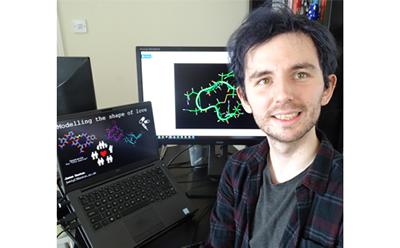Chemistry student models the shape of love in prizewinning thesis pitch

Postgraduate research student James Easton revealed how modelling a ‘love hormone’ could inspire new medicines to win the Southampton Three Minute Thesis (3MT®) Grand Final.
The concise PhD presentation became the second winner from the School of Chemistry in two years, following Gabriela Sitinova’s successful synopsis into a new form of molecular surgery.
James’ research is investigating oxytocin, sometimes known as the love or cuddle hormone, which is the peptide responsible for making us feel close to our romantic partners, children and even our pets.
“I feel honoured to be selected the winner as I thought all the talks were of a very high standard,” James says. “I’m delighted to be representing chemistry and especially computational chemistry as I progress into the semi-finals of the national competition.
“My project is investigating the 3D conformations of cyclic peptides, which are a class of important molecules in medicinal research. By investigating their 3D shapes we can better understand how these molecules interact with their targets and I’m working on ways to do this using computational simulations.
“I’m hoping my research will work towards increasing the use of computational data in the drug discovery process, increasing the efficiency of identifying and improving potential therapeutic molecules.”
The Southampton 3MT® contest is one of many such competitions held worldwide and was run online this summer as part of the University’s Festival of Doctoral Research. James was announced as the seventh University 3MT® Champion at the Doctoral College Awards Ceremony on Tuesday 30 June.
“It was definitely a challenge to summarise my research into such a short talk, but I tried to have fun with it and present it in an entertaining way,” James says. “It’s been great to be able talk to such a wide audience about my research and get such positive feedback about it.”
Daniel Wallace, also from James’ Faculty of Engineering and Physical Sciences, was chosen as the competition’s runner up and People’s Choice Winner. His research into Private Personal Sound Zones is exploring using multiple speakers to focus sound toward listeners while also aiming extra background noise at eavesdroppers in private environments such as intercoms at a bank counters.
Last year, Gabriela Sitinova was named University 3MT Champion for her study of inserting and studying atoms within a spherical Buckminsterfullerene molecule, or ‘buckyball’. These endohedral fullerenes contain phenomenal quantum properties that are examined by Southampton’s Magnetic Resonance (MagRes@Soton) Group.